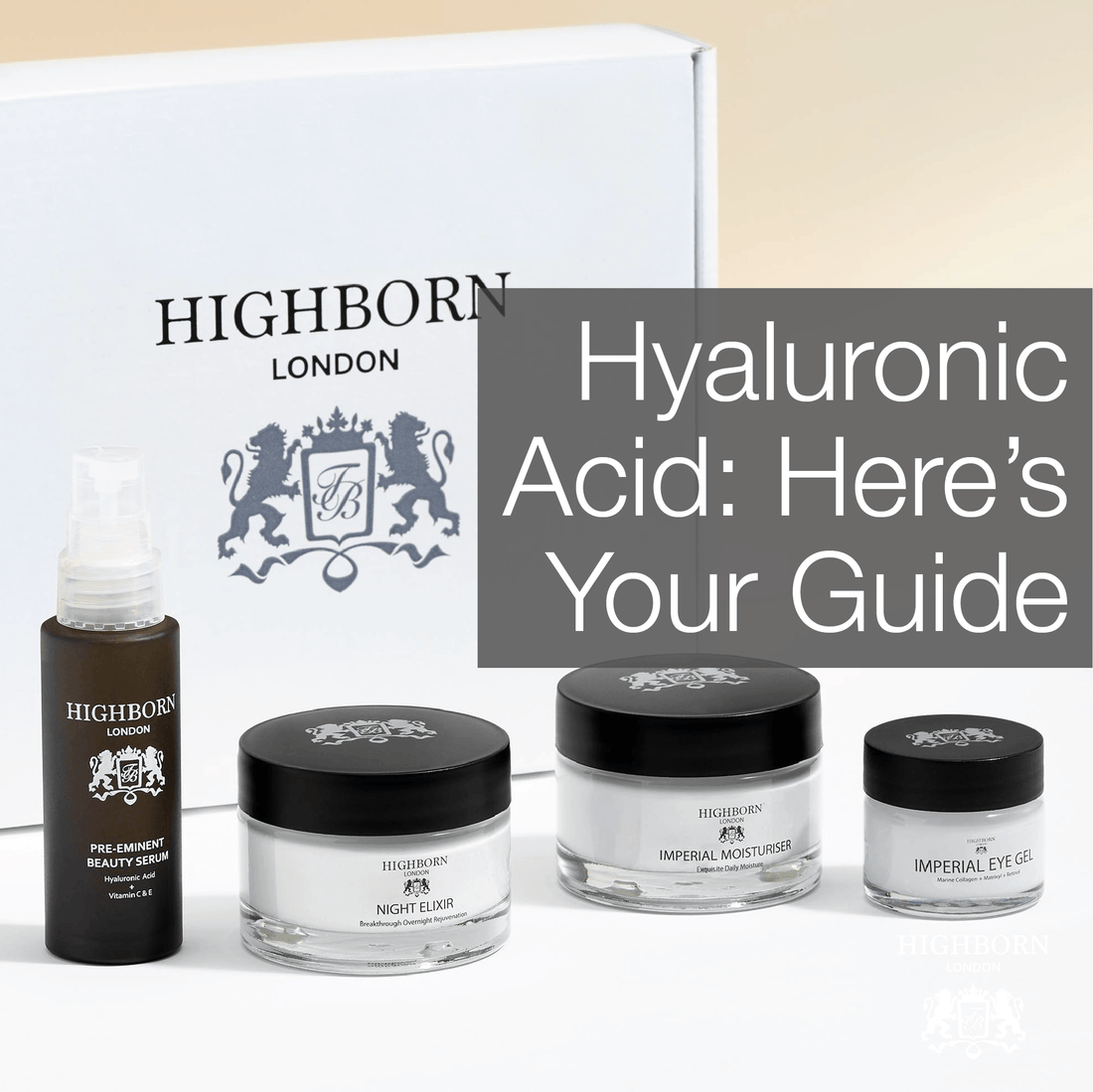
Hyaluronic Acid: The Ultimate Skin Hydrating Hero
Share

Most skincare ingredients have their 15 minutes of fame, but hyaluronic acid has been having a moment for, well, years. Chances are, at least one of your skincare products contains this skin-quenching ingredient, but do you really know what hyaluronic acid is and how great it is for your skin? Then, we’re here to help with that.
You all know that moisturising your skin is just as important as gentle cleansing and sun protection. But there are so many formulations out there, it’s hard to know which to trust. Well, let us tell you this: when it comes to choosing a moisturising ingredient that talks the talk AND walks the walk, you can’t go wrong with hyaluronic acid.
An acid may sound like the last thing you want near your face, but some of the best, most effective skincare ingredients are acids. Think vitamin C (ascorbic acid), glycolic acid, even retinol which is converted into retinoic acid by your skin. The fact is, most active ingredients that work on a cellular level and give you true, visible benefits are acids.
Not least of which is our favourite hydrating hero, hyaluronic acid.
What Is Hyaluronic Acid?
Otherwise known as hyaluronan and often abbreviated to HA, hyaluronic acid is a type of sugar compound that’s produced naturally by your body. Fun fact: HA is not just found in your skin, but also helps lubricate your eyes and joints in order for them to function properly.
But back to your skin… Along with lactic acid, minerals and peptides, HA is a major component of your skin’s natural moisturising factor where it acts as a humectant to help keep your skin soft, plump and hydrated. Wondering what a humectant is? Well, it’s a substance that works like a sponge to draw in water molecules and help keep things moist.
There are many humectants used in skincare (eg. glycerin, urea, honey and aloe vera), but hyaluronic acid has been proven to be one of the most effective, with the power to hold up to 1000 times its own weight in water. Impressive stuff, right?
So, How Does Hyaluronic Acid Work In Skincare?
As you age and your skin is subjected to the slings and arrows of pollution, stress and of course, the sun, your natural levels of hyaluronic acid take a real dip. This starts from around the age of 18 (yes, that early, yikes!) and is one of the many reasons why mature skin becomes dehydrated, dull, irritated and more prone to fine lines and wrinkles. Of course, when you couple a lack of HA with a natural degradation of collagen and elastin, it’s no wonder your skin is not what it used to be.
But all is not lost because this is where skincare comes to the rescue to help put back all the hyaluronic acid that’s vanished over the years.
The problem is that naturally-occurring hyaluronic acid has a large molecular structure, so it doesn’t penetrate the skin particularly well. At HIGHBORN, we get around this by extracting the salt from HA to produce a clever derivative called sodium hyaluronate.
Sodium hyaluronate has a lower molecular weight than pure HA, so it penetrates deeper into your skin for far better results. It’s also much more stable, so it’s less susceptible to oxidation. In our opinion sodium hyaluronate is like the stuff your body makes… but with bells on!
We believe in HA – and specifically sodium hyaluronate – so much, we use it in many of our awesome hydrating products, including Imperial Eye Gel, Pre-Eminent Beauty Serum, Imperial Moisturiser and Night Elixir. After all, its super-powered ability to attract water like a magnet makes it the smart choice for hydrating your skin. But where does all this water come from?
Well, that depends. If you live in a fairly humid climate, HA will attract water vapour from the air, but most of the time it draws it up from the lower layers of your skin where it’s not needed quite as much as the older cells at the surface.
Is Hyaluronic Acid Effective For All Skin Types?
Short answer: yes. Hyaluronic acid is one of the most gentle and well tolerated ingredients in skincare – a big reason why it’s loved by skincare manufacturers, dermatologists and beauty editors alike. It’s even great for sensitive and oily skin types, and is particularly effective in the winter when your skin is feeling more parched than normal.
Not only does hyaluronic acid offer the ultimate hydration boost, but it also stimulates collagen production, promotes healing and has powerful antioxidant properties. This means it’s ideal for counteracting free radical damage and the consequent breakdown of collagen – one of the major causes of premature ageing.
Of course, as with all skincare ingredients, there’s always a small risk of allergies or sensitivities, so it’s wise to perform a patch test when trying out any new skincare formulation for the first time. But, rest assured, HA really is one of the good guys.
Are There Any Downsides?
Yes and no. Hyaluronic acid needs water to do its job properly, so if you live in very dry conditions, where humidity levels are extremely low, it will draw all of its moisture from deep within your skin. In some cases, this can leave your skin feeling even more dehydrated than it was in the first place so, to counteract this, you must always combine any kind of HA with an occlusive or emollient ingredient.
Occlusives and emollients are waxy, creamy or oily substances that help seal moisture into your skin to stop water from evaporating into the air. Shea butter and skin-loving oils like jojoba, argan, coconut and olive are perfect examples to look out for.
Or, better still, apply Organic Age-Defying Facial Oil as the final step in your routine to lock in moisture, nourish your skin and add an extra, super-charged glow. And who doesn’t need a little glow in their lives?
And finally, what’s the best way to incorporate hyaluronic acid into your regime? Well, our Four Phase Day and Night Collection features the hyaluronic acid in all four HIGHBORNs within this popular set.

1 comment
I really want too try this cream. Ive tried so many and tbey are all much the same. No real improvement! Im going to order and try this. Theresa x